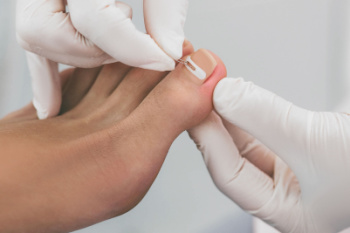
 Ingrown toenails, where the nail grows into the surrounding skin, can be treated through both surgical and non-surgical methods. Non-surgical treatments include proper nail care, such as trimming the nail straight across and soaking the foot in warm water to reduce swelling. A podiatrist, or foot doctor, can also treat an ingrown toenail by gently lifting the offending nail edge to place cotton underneath, which helps guide the nail to grow outward. Wearing roomy and comfortable shoes also relieves pressure on the affected toe. For more persistent or severe cases, surgical options might be necessary. A common procedure performed by podiatrists is a partial nail avulsion, where the ingrown portion of the nail is surgically removed under local anesthesia. In cases where ingrown toenails recur frequently, a podiatrist might perform a matrixectomy, which involves removing a portion of the nail bed to prevent the problematic section of the nail from growing back. If you are suffering from an ingrown toenail, it is suggested that you consult a podiatrist for treatment options to alleviate pain and prevent recurrence.
Ingrown toenails, where the nail grows into the surrounding skin, can be treated through both surgical and non-surgical methods. Non-surgical treatments include proper nail care, such as trimming the nail straight across and soaking the foot in warm water to reduce swelling. A podiatrist, or foot doctor, can also treat an ingrown toenail by gently lifting the offending nail edge to place cotton underneath, which helps guide the nail to grow outward. Wearing roomy and comfortable shoes also relieves pressure on the affected toe. For more persistent or severe cases, surgical options might be necessary. A common procedure performed by podiatrists is a partial nail avulsion, where the ingrown portion of the nail is surgically removed under local anesthesia. In cases where ingrown toenails recur frequently, a podiatrist might perform a matrixectomy, which involves removing a portion of the nail bed to prevent the problematic section of the nail from growing back. If you are suffering from an ingrown toenail, it is suggested that you consult a podiatrist for treatment options to alleviate pain and prevent recurrence.
Ingrown toenails can become painful if they are not treated properly. For more information about ingrown toenails, contact Dr. Nooshin Zolfaghari of VIP Foot & Ankle Center. Our doctor can provide the care you need to keep you pain-free and on your feet.
Ingrown Toenails
Ingrown toenails occur when a toenail grows sideways into the bed of the nail, causing pain, swelling, and possibly infection.
Causes
Prevention
Because ingrown toenails are not something found outside of shoe-wearing cultures, going barefoot as often as possible will decrease the likeliness of developing ingrown toenails. Wearing proper fitting shoes and using proper cutting techniques will also help decrease your risk of developing ingrown toenails.
Treatment
Ingrown toenails are a very treatable foot condition. In minor cases, soaking the affected area in salt or antibacterial soaps will not only help with the ingrown nail itself, but also help prevent any infections from occurring. In more severe cases, surgery is an option. In either case, speaking to your podiatrist about this condition will help you get a better understanding of specific treatment options that are right for you.
If you have any questions please feel free to contact our office located in Pembroke Pines, FL . We offer the newest diagnostic and treatment technologies for all your foot and ankle needs.